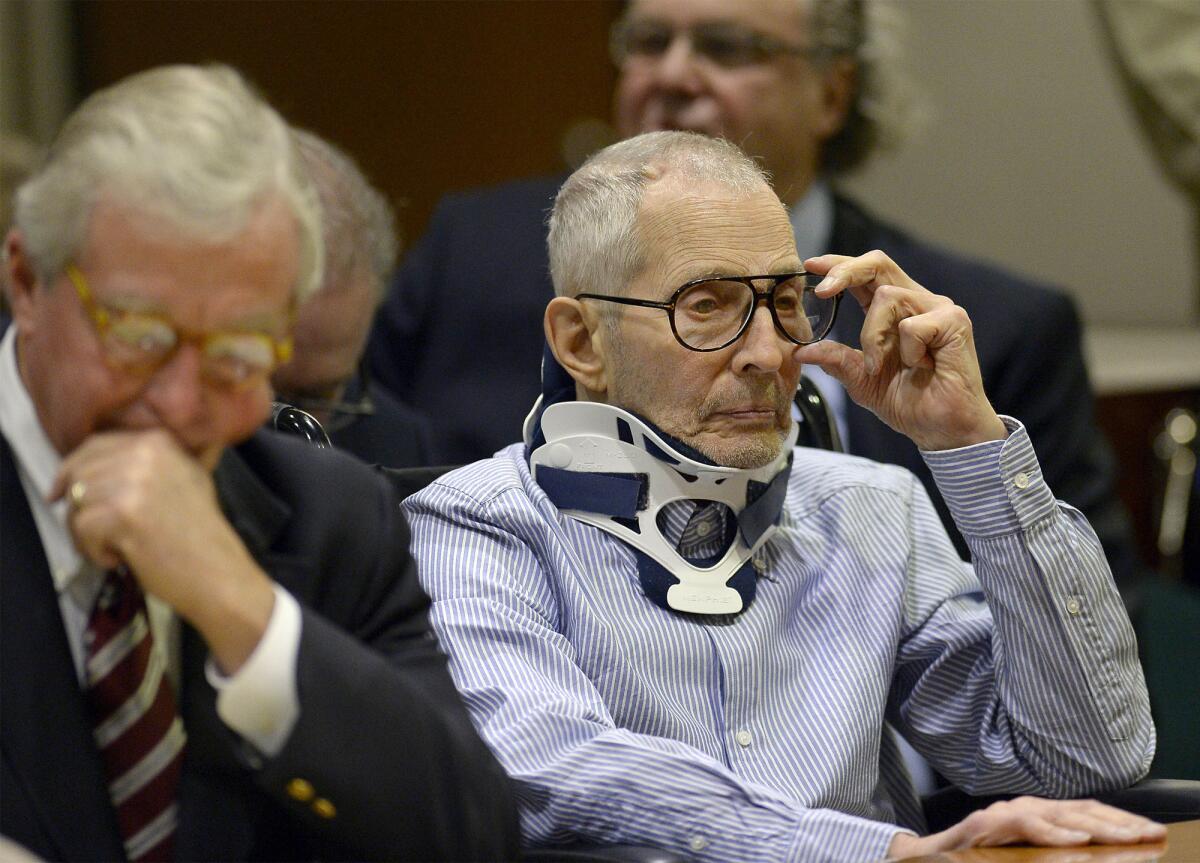Robert Durst’s lawyers challenge evidence and accuse prosecutor of ‘deceptive’ jailhouse interview

Robert Durst has said he’s eager to let a Los Angeles jury decide whether he killed his friend and confidant Susan Berman, but a brewing legal battle may impede the start of any trial.
Attorneys for Durst filed court papers Thursday that challenge some of the evidence against the eccentric millionaire and offer a clearer glimpse into their defense. They argue that the high-profile murder case was rushed by an HBO miniseries and tainted by an improper jailhouse interrogation by a veteran Los Angeles County prosecutor.
The filing in Los Angeles County Superior Court comes more than a month after Durst, 73, arrived in Southern California for what is expected to be a sensational trial over the death of Berman in 2000 at her Benedict Canyon cottage.
In his first court appearance in November, Durst sat in a wheelchair and pleaded not guilty, telling the judge, “I did not kill Susan Berman.” He remains in custody at L.A. County Jail.
Durst, the scion of a prominent Manhattan real estate family, has for years generated fascination that climaxed in a 2015 miniseries on HBO, “The Jinx.”
The six-part documentary series explored the disappearance of his wife, the death of Berman and his acquittal of murder charges in the slaying of a neighbor in Texas. It came to a dramatic finale with footage of Durst muttering into a microphone during a bathroom break: “What the hell did I do? Killed them all, of course.”
The final episode’s revelation was compounded by what happened off-camera. On the eve of the episode’s March 15, 2015, airing, authorities arrested Durst in New Orleans, where he had been staying in a hotel under a fake name. He had marijuana, a .38-caliber revolver, more than $40,000 in cash and a mask, according to court papers.
The next morning before court, L.A. County Deputy Dist. Atty. John Lewin questioned Durst for about two hours — without defense attorneys present, they say.
The interrogation by Lewin was “improper and deceptive,” Durst’s lawyers said. They said their client was “frail, afraid and quite disoriented,” according to court papers.
Lewin countered that Durst “intelligently and voluntarily” agreed to the interview, according to a declaration filed Dec. 5.
Durst’s attorneys mounted their challenges to the evidence in response to a request by the Los Angeles County district attorney’s office for a judge to appoint a special monitor to evaluate evidence that may contain materials restricted by attorney-client privilege. A hearing on the matter is scheduled for Wednesday.
The evidence in question comes from three sources: Durst’s New Orleans hotel room, his Houston home and the Hudson Valley, N.Y., home of a close family friend.
Prosecutors say the evidence was lawfully seized but that out of “an abundance of caution,” a judge should appoint an independent monitor to separate materials covered by attorney-client privilege.
Defense lawyers disagree, saying the search in New Orleans was illegal — an argument previously shot down by a federal judge overseeing a related weapons case against Durst.
As in so many elements connected to the case, “The Jinx” and its director, Andrew Jarecki, crop up.
Investigators want to examine roughly 60 boxes of personal papers involving Durst family legal disputes that were stored in the Hudson Valley basement of friend Susan Giordano. Prosecutors contend that Durst allowed Jarecki’s crew to rifle through the material to find a deposition of Durst’s brother, Douglas Durst, and scan various materials for “The Jinx,” thus waiving any claim to attorney-client privilege.
Jarecki submitted a declaration to prosecutors, describing how Giordano allowed him and his crew into her home with Durst’s blessing. Prosecutors say Durst reiterated that blessing in his jailhouse interview.
“Why did you give them that stuff?” Lewin, the prosecutor asked, according to a partial transcript of the questioning in court papers. Durst replied: “I wanted them to see the whole thing…. I couldn’t, uh, get them to see me as an acceptable human being if I was covering things up.”
Defense lawyers say Jarecki was only authorized to locate a DVD of Durst’s brother’s deposition.
The court filings by prosecutors and defense attorneys also provide glimpses into the years-long investigation, which has been led by LAPD Det. Gevork Shamlyan since 2012.
One report from New York State Police notes how six weeks before Durst’s arrest, L.A. prosecutors and detectives conducted a series of interviews with neighbors and friends of Durst and wife Kathleen Durst, who has been missing since 1982.
The same report says a contractor at Durst’s former South Salem, N.Y., home found a 19-inch saw behind a wall in the residence after Durst had moved out.
According to the report from 2016, the saw was secured in a long-term evidence vault while New York authorities discussed additional forensic tests.
ALSO
Major storms barrel into California: ‘Every field is a big lake’
Police killing of unarmed, 73-year-old grandfather sparks anger, anguish
Ex-owner of dog that had 42-pound tumor is charged with animal cruelty
More to Read
Sign up for Essential California
The most important California stories and recommendations in your inbox every morning.
You may occasionally receive promotional content from the Los Angeles Times.










